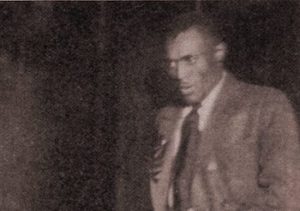
Lovett Huey Fort-Whiteman
*On this date in 1894, we mark the birth of Lovett Fort-Whiteman. He was a Black political activist and Communist International functionary.
Lovett Huey Fort-Whiteman was born in Dallas, Texas. His father, Moses Whiteman, was a slave in South Carolina and relocated to Texas in 1887, where he worked as a janitor and a small-scale cattle rancher. At the age of 35, Moses Whiteman married the 15-year-old Elizabeth Fort. Lovett was the first of the couple's children. Young Fort-Whiteman received a better education than was common for many Black children of the era in the Dallas public schools, attending one of the few high schools in the American South at that day open to Blacks.
Following graduation from high school, Fort-Whiteman enrolled at the Tuskegee Institute in Tuskegee, Alabama, around 1906, from which he graduated as a machinist. After completing his studies at Tuskegee, Fort-Whiteman gained admission to Meharry Medical College in Nashville, Tennessee, to become a medical doctor. Still, he did not complete the course of his studies. By 1910, his father died, and Fort-Whiteman had moved with his mother and younger sister to Harlem, New York City. He worked as a hotel bellman to support the family while harboring dreams of becoming a professional actor.
The first Black to attend a Comintern training school in the Soviet Union in 1924, Fort-Whiteman was later named the first national organizer of the American Negro Labor Congress, a mass organization (front group) of the Communist Party, USA. Fort-Whiteman was once called "the reddest of the Blacks" by Time magazine. 1935 Fort-Whiteman was the subject of a Comintern committee meeting concerning the American party, with Earl Browder, William Schneiderman, and Sam Darcy present. This led to a resolution for “Comrades Paterson (sic) and [James] Ford [another black Communist “leader”]” to hold “a meeting with all the Negro comrades” to discuss the “reported efforts of Lovett Whiteman to mislead some of the Negro comrades.” Fort-Whiteman also praised Nikolai Bukharin and Karl Radek, who were accused of sympathizing with Trotsky.
On July 1, 1937, Fort-Whiteman was sentenced to five years of internal exile in Alma-Ata, Kazakhstan, where he taught school and boxing. On May 8, 1938, Fort-Whiteman’s punishment was upped to five years of hard labor at the Sevvostlag Prison Labor Camp in Siberia. Prisoners slept in holes dug in the tundra as they worked on the Kolyma Highway. Temperatures went down to 60 below.
He died in 1939. Long-standing rumors about Fort Whiteman’s demise were confirmed when archives were opened for a period after the fall of the Soviet Union. Harvey Klehr, John Earl Haynes, and Kyrill M. Anderson reproduced the death certificate and fingerprints, which came from Kazakhstan after its independence in 1996, in their book The Soviet World of American Communism (Yale University Press, 1998).